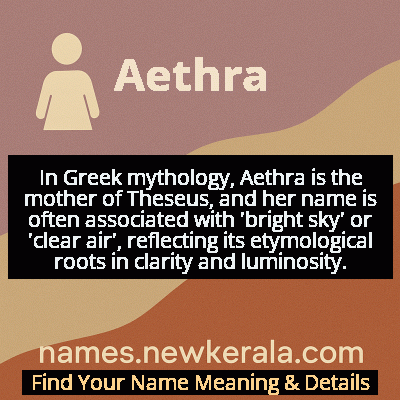Aethra Name Meaning & Details
Origin, Popularity, Numerology Analysis & Name Meaning of Aethra
Discover the origin, meaning, and cultural significance of the name AETHRA. Delve into its historical roots and explore the lasting impact it has had on communities and traditions.
Name
Aethra
Gender
Female
Origin
Greek
Lucky Number
8
Meaning of the Name - Aethra
In Greek mythology, Aethra is the mother of Theseus, and her name is often associated with 'bright sky' or 'clear air', reflecting its etymological roots in clarity and luminosity.
Aethra - Complete Numerology Analysis
Your Numerology Number
Based on Pythagorean Numerology System
Ruling Planet
Saturn
Positive Nature
Ambitious, efficient, realistic, and authoritative.
Negative Traits
Materialistic, stressed, confrontational, and can be overly ambitious.
Lucky Colours
Dark blue, black.
Lucky Days
Saturday.
Lucky Stones
Blue sapphire, amethyst.
Harmony Numbers
2, 4, 6.
Best Suited Professions
Business leaders, managers, financial services, law enforcement.
What People Like About You
Leadership, determination, organizational skills.
Famous People Named Aethra
Aethra (Greek Mythology)
Mythological Figure
Mother of the legendary hero Theseus and key figure in Athenian foundation myths
Aethra (Astronomy)
Celestial Body
Saturn's moon discovered in 2004, continuing the tradition of naming Saturn's moons after mythological figures
Aethra (Classical Literature)
Literary Character
Featured in numerous ancient texts including works by Plutarch and various Greek tragedians
Name Variations & International Equivalents
Click on blue names to explore their detailed meanings. Gray names with will be available soon.
Cultural & Historical Significance
Beyond her mythological role, Aethra appears in various classical literary works, including Euripides' lost tragedy and numerous references in later Roman literature. Her character has been interpreted through different historical lenses - as a symbol of Athenian matriarchal wisdom, as a representation of the connection between Troezen and Athens, and as an example of the important but often overlooked maternal figures in heroic narratives. In Renaissance and later art, she occasionally appears in depictions of Theseus' story, though she remains less prominent than other mythological women. Her enduring presence in cultural memory demonstrates how even secondary mythological characters can carry significant symbolic weight across generations.
Extended Personality Analysis
The name Aethra evokes personality traits deeply connected to its mythological origins and linguistic meaning. Individuals with this name are often perceived as possessing celestial wisdom and maternal strength, combining intellectual clarity with emotional depth. They tend to be natural guides and counselors, offering perspective and insight much like the 'bright sky' meaning suggests. Their personality typically includes a strong sense of responsibility toward others, particularly family, and the ability to see the bigger picture in complex situations. These individuals often demonstrate remarkable resilience and adaptability, capable of navigating challenging circumstances with grace and determination.
Aethra-named individuals frequently exhibit a blend of traditional values and progressive thinking, honoring heritage while embracing innovation. They are often described as having a calming presence and the ability to illuminate solutions where others see only problems. Their communication style tends to be clear and thoughtful, and they often serve as peacemakers in conflicts. The mythological Aethra's role in preparing Theseus for his heroic journey suggests that modern bearers of the name might naturally mentor and support others in achieving their potential. They typically value knowledge, history, and cultural traditions while maintaining a forward-looking perspective that helps them adapt to changing circumstances without losing their core identity.
Modern Usage & Popularity
In contemporary naming practices, Aethra remains an exceptionally rare choice that appeals to parents seeking unique names with profound mythological roots. While it doesn't appear in official baby name statistics in most English-speaking countries, it has seen occasional use among classical scholars, mythology enthusiasts, and families with Greek heritage. The name's modern usage reflects several current trends: the growing popularity of mythological names, the appeal of rare classical names, and the search for names with strong female associations. In Greece itself, the modern variant 'Ethra' sees slightly more use, though it remains uncommon. The name has gained some visibility through its astronomical connection as one of Saturn's moons, and through popular mythology retellings in literature and media. Its rarity makes it an distinctive choice for parents wanting to avoid common names while still selecting something with historical depth and beautiful meaning. The name's elegant sound and classical pedigree suggest it may see gradual increase in usage as mythological names continue their popularity surge.
Symbolic & Spiritual Meanings
Symbolically, Aethra represents multiple layers of meaning that transcend her mythological narrative. The name's primary meaning of 'bright sky' or 'clear atmosphere' connects it to concepts of illumination, clarity, and higher perspective. This makes Aethra a symbol of enlightenment and understanding - the ability to see truth clearly and rise above confusion or deception. In psychological terms, she represents the conscious mind's capacity for insight and the wisdom that comes from seeing situations from a broader vantage point. The mythological Aethra's role as guide and preparer of heroes symbolizes the nurturing intelligence that enables great achievements.
Metaphorically, Aethra embodies the bridge between different realms - mortal and divine, earthly and celestial, past and future. Her story of dual paternity (mortal and godly) represents the integration of human and transcendent qualities. She symbolizes maternal wisdom that is both practical and visionary, capable of preparing the next generation for their destinies while honoring tradition. The rock under which Aegeus hid his tokens becomes a powerful symbol of challenges that must be overcome, with Aethra representing the knowledge and support that makes such overcoming possible. In modern symbolic interpretation, Aethra can represent the inner wisdom that guides individuals through life's challenges, the clarity that emerges after struggle, and the enduring power of maternal love and guidance across generations.

